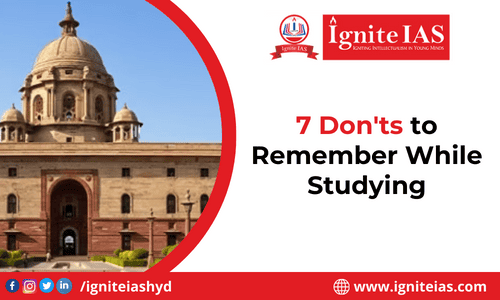Preparing for exams can be a challenging yet rewarding journey. As students gear up to ace their tests, it’s essential to keep certain pitfalls in mind that can hinder their progress. At Ignite IAS, we believe in guiding students not only on what to do but also on what to avoid during their study sessions. Let’s explore seven crucial “don’ts” to keep in mind while studying for exams.
1. Don’t Procrastinate:
Procrastination is the enemy of productivity. Avoid putting off your study sessions until the last minute. Instead, create a study schedule and stick to it. Break down your study material into manageable chunks and set realistic goals for each session.
2. Don’t Multitask:
While it may seem efficient to juggle multiple tasks simultaneously, multitasking can actually impair learning and retention. Avoid distractions such as social media, television, or unrelated tasks while studying. Focus on one subject or topic at a time to maximize concentration and comprehension.
3. Don’t Overload Yourself:
Studying for long hours without breaks can lead to burnout and decreased productivity. Avoid overloading yourself with excessive study sessions. Take regular breaks to rest and recharge your mind. Use techniques like the Pomodoro Technique, which involves studying in short bursts with breaks in between.
4. Don’t Ignore Your Health:
Your physical and mental well-being play a crucial role in your academic performance. Don’t neglect your health while studying for exams. Ensure you’re getting adequate sleep, nutrition, and exercise. Stay hydrated, eat balanced meals, and prioritize self-care to maintain optimal cognitive function.
5. Don’t Cram:
Cramming may seem like a quick fix for exam preparation, but it’s not an effective long-term strategy. Avoid cramming large amounts of information at the last minute. Instead, review material regularly and space out your study sessions over time. This approach promotes better retention and understanding of the material.
6. Don’t Rely Solely on Memorization:
While memorization is an essential aspect of exam preparation, it’s not the only skill you need to succeed. Avoid focusing solely on rote memorization. Strive to understand the underlying concepts, apply critical thinking skills, and make connections between different topics. Active learning promotes deeper understanding and better problem-solving abilities.
7. Don’t Compare Yourself to Others:
Every student has their own unique strengths, weaknesses, and learning pace. Avoid comparing yourself to others or getting discouraged by someone else’s study methods or progress. Focus on your own journey, set realistic goals, and celebrate your achievements along the way. Remember that success is measured by personal growth and improvement.
Conclusion: Navigating Exam Preparation with Confidence
As students embark on their exam preparation journey, it’s crucial to be mindful of the “don’ts” that can impede progress. By avoiding procrastination, multitasking, overloading, neglecting health, cramming, relying solely on memorization, and comparing oneself to others, students can navigate their study sessions with confidence and efficiency. At Ignite IAS, we’re committed to empowering students with the tools and strategies they need to excel academically. Join us in embracing a proactive approach to exam preparation and achieving academic success.
FAQ’s :
1. How can I improve my study habits for better exam performance? Improving study habits involves creating a structured study schedule, staying organized, setting realistic goals, minimizing distractions, and practicing active learning techniques like summarizing and self-testing.
2. What are some effective time management strategies for exam preparation? Effective time management strategies include prioritizing tasks, breaking down study material into smaller chunks, using tools like calendars and planners, setting deadlines, and allocating specific time slots for studying different subjects.
3. How can I stay motivated and focused during exam preparation? Staying motivated and focused requires setting clear goals, visualizing success, celebrating progress, maintaining a positive attitude, seeking support from peers or mentors, and taking regular breaks to prevent burnout.
4. What should I do if I feel overwhelmed by exam pressure? If you feel overwhelmed by exam pressure, it’s essential to take a step back, practice relaxation techniques like deep breathing or meditation, break tasks into smaller steps, seek help from teachers or counselors, and prioritize self-care activities.
5. How can I effectively manage exam-related stress and anxiety? Managing exam-related stress and anxiety involves adopting stress-reduction techniques such as exercise, mindfulness, adequate sleep, maintaining a healthy lifestyle, seeking social support, and reframing negative thoughts into positive ones.
6. What are some strategies for retaining information and avoiding forgetting it during exams? Strategies for retaining information include spaced repetition, active recall, elaborative rehearsal, mnemonic devices, teaching others, creating mind maps or summaries, and practicing retrieval through quizzes or flashcards.
7. How can I deal with distractions while studying? Dealing with distractions involves creating a conducive study environment, minimizing digital distractions by turning off notifications, using website blockers, setting specific study times, and practicing focused concentration techniques.
8. What should I do if I encounter difficult or challenging topics while studying? If you encounter difficult topics while studying, break them down into smaller, more manageable parts, seek clarification from teachers or peers, use supplementary resources like textbooks or online tutorials, and practice active learning techniques to deepen understanding.
9. How can I balance my study schedule with other commitments like extracurricular activities or part-time jobs? Balancing study schedules with other commitments requires effective time management, prioritization of tasks, setting boundaries, learning to say no when necessary, and maximizing productivity during available study time.
10. How can I ensure that I perform well on exam day? To perform well on exam day, ensure you get adequate rest the night before, eat a balanced meal, arrive at the exam venue early, read and follow instructions carefully, manage your time wisely during the exam, and stay calm and focused throughout the test.
For admissions and inquiries, contact us at 7997992479/80/81 or visit https://www.igniteias.com to explore our integrated courses and coaching offerings tailored to your aspirations.




